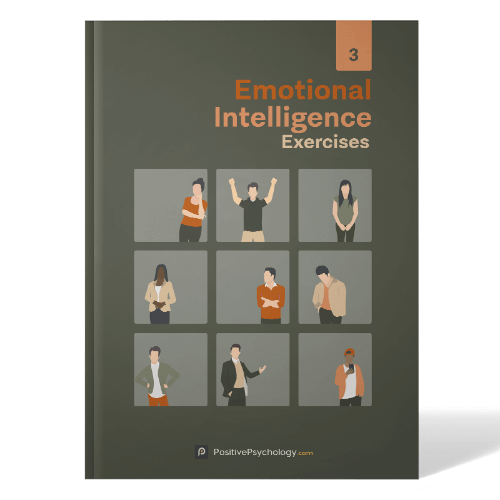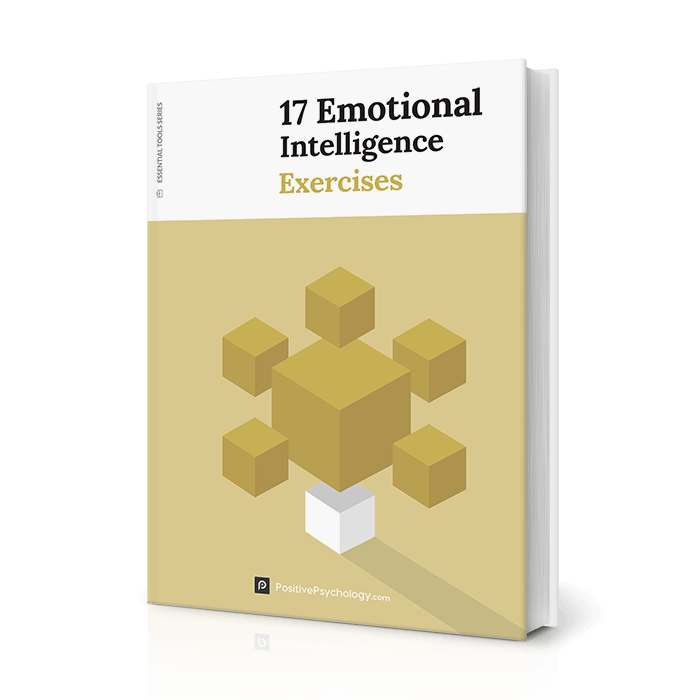15 Most Valuable Emotional Intelligence TED Talks on YouTube
 Emotional intelligence gets a lot of attention in the field of leadership research, and it is drawing increasing attention from many other fields as well.
Emotional intelligence gets a lot of attention in the field of leadership research, and it is drawing increasing attention from many other fields as well.
By increasing empathy and compassion through accurate awareness and acceptance of emotions, real widespread change can be ignited.
Since TED talks appeared in 1984, inspirational messages to the world from experts and change makers from a variety of backgrounds have been shared and reshared across the globe. Emotional intelligence (EI) is a popular topic on the TED circuit.
Read along to learn more about the most valuable EI talks on TED.
But first, we thought you might like to download our three Emotional Intelligence Exercises for free. These science-based exercises will not only enhance your ability to understand and work with your emotions, but also give you the tools to foster the emotional intelligence of your clients, students, or employees.
This Article Contains:
- 1. Why Aren’t We More Compassionate?
- 2. The Art of Managing Emotions
- 3. You Aren’t at the Mercy of Your Emotions – Your Brain Creates Them
- 4. How to Practice Emotional Hygiene
- 5. Emotional Mastery: The Gifted Wisdom of Unpleasant Feelings
- 6. The Power of Emotional Intelligence
- 7. 6 Steps to Improve Your Emotional Intelligence
- 8. How We’ve Been Misled by Emotional Intelligence
- 9. The Light and Dark Side of Emotional Intelligence
- 10. The Gift and Power of Emotional Courage
- 11. The Three Secrets of Resilient People
- 12. The Importance of Raising an Emotionally Intelligent Child
- 13. Emotional Intelligence From a Teenage Perspective
- 14. The People Currency: Practicing Emotional Intelligence
- 15. Emotional Intelligence: Using the Laws of Attraction
- A Take-Home Message
- References
1. Why Aren’t We More Compassionate?
Daniel Goleman wrote the book Emotional Intelligence in the 1990s. His 2007 TED talk on the topic brought compassion to the stage. He spoke about the spectrum that exists from self-absorption to compassionate altruism.
His personal “awakening” into “the human moment” is an impactful message for humanity as a whole. With people hurrying through their lives in what he calls an “urban trance,” an awakening to an empathetic response to other human beings changes the reaction in others. Goleman stresses that there is zero correlation between IQ and emotional empathy.
Goleman speaks about consumer responsibility and the importance of awakening to the manufacturing processes of any product purchased. When consumers awaken to the value of virtuous products (those with little or no environmental impact), our impact on our environment can shift. When compassion leads, change is made.
Compassionate decisions can take place daily. Goleman’s talk highlights the need for improvement in these decisions everywhere. The more we are awakened to the awareness of the need for emotional intelligence, the better a world we can create.
2. The Art of Managing Emotions
Daniel Goleman also shares his strategies to build emotional intelligence in the workplace.
He discusses the importance of leaders using strategies to get workers into a state of flow. Goleman also stresses the power of the leader in the emotional landscape of a company and the intentional use of mirror neurons from the social brain.
He lists the following as ways for leaders to support their workplace in reaching states of flow:
- Setting clear goals and having flexibility in their attainment.
- Giving immediate feedback on how progress toward those goals is made.
- Challenging and growing skillsets in workers.
- Matching workers’ ability with required tasks, to improve engagement.
3. You Aren’t at the Mercy of Your Emotions – Your Brain Creates Them
Lisa Feldman Barrett’s derived her talk from the neuroscience research she and her colleagues conducted. Their meta-analysis of emotions has given neuroscientists and psychologists great insight into the architecture of the experience of human emotions (Lindquist, Wagner, Kober, Bliss-Moreau, & Barrett, 2012). She speaks of the empowering nature of the science of emotions.
Her research explains that the brain constructs predictions to explain physical experiences. Human beings are born with a physical barometer for basic sensations like calm, agitation, and comfort vs. discomfort. She explains that emotions are mere “guesses” or “predictions” that are “most like” other life experiences.
Emotions are not universally experienced. We each have to understand that our emotional behavior is our responsibility. When you misbehave, it is your responsibility to improve your emotional landscape.
4. How to Practice Emotional Hygiene
Dr. Guy Winch delivers an inspirational talk on the importance of intentional practices in emotional hygiene. Protecting ourselves from psychological injuries like failure, rejection, and loneliness is a neglected practice. By prioritizing psychological health and developing skills to counter psychological damage, people can “stop emotional bleeding.”
By creating an emotional first aid kit to help people override learned helplessness, Winch suggests that people can improve overall wellbeing. Emotional injuries are plentiful, and most people don’t have the emotional bandages needed to cope. Knowing that loneliness increases mortality rates, he suggests, can help motivate people to better understand how to build emotional resilience.
Tendencies like rumination and negative self-talk are habits that can be countered. With good emotional hygiene, more emotionally healthy humans can emerge. It should be just important as brushing your teeth.
5. Emotional Mastery: The Gifted Wisdom of Unpleasant Feelings
Dr. Joan Rosenberg’s talk on emotional intelligence and unpleasant feelings is powerful and transformational. She discusses the science of emotions and the influence of “gut punches” on capabilities in life. Rosenberg says:
If you can experience and move through eight unpleasant feelings, you can do anything you want in life.
Her offering of the “Rosenberg Reset” is a formula that everyone should learn and put into practice. Improving self-confidence by responding to unpleasant feelings with intention, patience, and choice can shift emotional wellbeing.
The Rosenberg Reset
1 choice
8 unpleasant feelings
90 seconds
The choice is to stay present through unpleasant feelings, instead of numbing or pushing the emotion aside.
The unpleasant feelings are sadness, shame, helplessness, anger, vulnerability, embarrassment, disappointment, and frustration.
Ninety seconds is how long it takes for the neurochemicals to “rush and flush” as a physical experience in the body.
Rather than placing these unpleasant emotions in the category of “bad” or “negative,” a simple shift in language to “unpleasant” can reframe the experience as temporary and navigable. Instead of placing emotions in the space of frangible experience, we can shift to empowered patience. The formula is almost like an inoculating shot that briefly stings before providing lasting resilience.
6. The Power of Emotional Intelligence
Travis Bradberry delivers an informative talk on the importance of developing emotional intelligence. He explains emotions and how they work in the brain. He also explains the difference between EQ and IQ, as well as between EQ and personality.
Bradberry gives three “silver bullets” for increasing emotional intelligence. He talks about countering stress with an attitude of gratitude, and the importance of improving sleep hygiene and reducing caffeine.
7. 6 Steps to Improve Your Emotional Intelligence
Ramona Hacker offered six steps to improve emotional intelligence in her TED talk, after having to discover ways to overcome burnout for herself. She listed the six steps as follows:
- Build awareness to a level of unconscious competence.
- Differentiate and analyze emotions.
- Accept and appreciate emotions as signals.
- Reflect and find the origin.
- Handle the emotions.
- Then handle the emotions of others.
8. How We’ve Been Misled by Emotional Intelligence
Executive leadership coach Kris Girrell, author of A Married Man’s Survival Guide, explores emotional intelligence and highly intelligent scientists in his TED talk. He takes you through his introduction of the subject in leadership as he presented it to a “group of Sheldons.” His creation of the periodic table of emotions was particularly interesting and clever.
His discussion of “the dark night of the soul” introduced humanity’s sudden awareness of emotion as a surprising and sometimes frightening experience. Girrell shares his personal experience with despair. He has a deep understanding of emotional experience and the importance of emotional intelligence in leadership.
A Guide to the Periodic Table of Emotions was created as an e-book and is available on Amazon.
9. The Light and Dark Side of Emotional Intelligence
Alison Bacon delivers an interesting talk on emotional intelligence and the psychopaths among us.
She discusses an interesting study at Plymouth University in the UK that is using virtual reality to test behavior and emotional intelligence. Being adept at understanding and manipulating the emotions of others is a marker of high emotional intelligence linked with the Dark Triad (narcissism, Machiavellianism, and psychopathy).
Narcissism and psychopathy are positively linked with emotional intelligence (Nagler, Reiter, Furtner, & Rauthmann, 2014), and this study shows the importance of building emotional intelligence in all people.
Knowing that emotional manipulators may not be sociopathic killers is helpful, but it is even more impactful to know that they are present in daily life. With improvements in emotional intelligence, emotionally intelligent individuals with a strong moral compass are less easily manipulated.
10. The Gift and Power of Emotional Courage
Susan David’s talk on emotional agility and the power it delivers is inspirational. Her personal story of grief and loss, and her radical acceptance of difficult, unpleasant emotions helps paint a clear picture of emotional intelligence.
The accuracy with which people label their emotions is essential for mining those emotions for data and later aligning them with personal values.
Here are some powerful quotes from her talk.
“Discomfort is the price of admission to a meaningful life.”
“We generate the pathway to our best selves via our emotions.”
“What he showed me is that courage is not the absence of fear; courage is fear walking.”
A valuable tip that David offered during the talk was an appropriate use of language in the description of emotions. For instance, rather than saying, “I am angry,” replace it with, “I’m noticing that I’m feeling angry.” Separating the self from the emotion is useful in using emotions as data and aligning values and actions.
David is the author of Emotional Agility: Get Unstuck, Embrace Change, and Thrive in Work and Life. This award-winning emotional intelligence book guides people into building this agility and understanding that emotional intelligence is key to a successful life. Her work is based on 20 years of research in emotions.
11. The Three Secrets of Resilient People
Lucy Hone shares her personal story about overcoming extreme adversity by using the skills in emotional intelligence she’d learned through her research in resilience. Her compelling story drives the need for improvement in emotional intelligence.
Having worked with the US Army on mental resilience training, it is apparent that this speaker is a soldier herself.
Her three secrets are as follows:
- Realization of suffering as a part of life. We all have a choice in how we understand pain. Instead of uttering, “why me?” it is important to say, “why not me?” Hard times can happen to anyone at any time. We have two choices in how we handle that suffering: apathy, which means we end up wallowing in the pain, or growth. The second choice gives us the opportunity to heal through it, learn from it, and live on with resilience.
- Selective attention to what is changeable and what is not. This does not diminish the pain, but rather is a choice to intentionally tune into the good. It is focusing on social support in hard times. It is hunting for the benefits in any situation.
- “Is what I’m doing helping or harming me?” Hone encourages anyone suffering to be mindful of their behavior and to choose only what will help. Emotional intelligence is understanding that this awareness is vital to growth.
12. The Importance of Raising an Emotionally Intelligent Child
Erika Brodnock shares her vulnerable story about mental health and her incredible program for children called Karisma Kidz. Her business coaches kids through their problems, managing and countering difficulties by using play.
The talk includes positivity, Barbara Fredrickson’s work, and its importance for children’s wellbeing. Brodnock also stresses the importance of gratitude in her service to kids.
By creatively blending psychology and energy work, kids are served with preventive skills and increased emotional intelligence.
13. Emotional Intelligence from a Teenage Perspective
Maximillian Park speaks as a vulnerable teen about the need for emotional intelligence classes in schools. He brilliantly highlights the needs that young people have for the skills that come along with a high EQ.
Raising his EQ was a personal effort, and he encourages us to imagine a world where these skills were built into an education curriculum.
This is the dream of the Dalai Lama, according to Daniel Goleman, in his book A Force for Good. With increased empathy and compassion on a global scale, our next generation could live in a safer and more environmentally conscious world. A highly recommended book by the author, you can find it on Amazon.
The Center for Positive Education endeavors to help parents and teachers become more aware of the skills in positive psychology that are available to assist in raising kids with emotional intelligence.
14. The People Currency: Practicing Emotional Intelligence
Jason Bridges offers his personal story of building his EQ after a traumatic brain injury. He found through his struggle that the most crucial thing in building success was the relationships he built with the people around him.
Bridges built his businesses by injecting emotional intelligence into his business model and effectively teaching emotional intelligence to his employees.
Bridges recommends using the smile challenge as a powerful way to raise EQ quickly. By using one’s smile to make five others smile per day, they are raising their EQ. This challenge builds self-awareness, social awareness, empathy, and relationships. It is a free and simple way to begin a practice for emotional intelligence.
“Be interested, not interesting,” is a motto that Mr. Bridges uses and teaches those seeking higher EQ.
15. Emotional Intelligence: Using the Laws of Attraction
Dr. D. Ivan Young delivers a talk on improving one’s connection with their subconscious mind. Through improving presence in the moment-to-moment meaning, one’s manifestation of desires can be realized. With a deeper understanding of emotions and aligning thoughts with desired values, actions follow.
Thoughts, emotions, and actions all lead to attracting into your life what you desire to be present. With mindful presence, one can shift their life. Young teaches this to students as a way to show up as their best selves.
A Take-Home Message
Each setting in which emotional intelligence skills are built improves the world. The more human beings can tune into their personal experience and mindfully control their emotional responses, the better the world will become. Mining for information with emotional intelligence skills gives us power over our brains.
We are all leaders with our own sphere of influence. It is the responsibility of each leader to show up in the world as their higher selves. Emotional intelligence is the pathway for meaningful leadership. It is fantastic that anyone can build it.
Thanks for reading.
We hope you enjoyed reading this article. Don’t forget to download our three Emotional Intelligence Exercises for free.
By the way, do you love TED Talks? Then we share even more positive psychology TED Talks in this article.
- Lindquist, K. A., Wagner, T. D., Kober, H., H. Bliss-Moreau, E., & Barrett, L. F. (2012). The brain basis of emotion: A meta-analytic review. The Behavioral and Brain Sciences, 35(3), 121-143.
- Nagler, U. K. J., Reiter, K. J., Furtner, M. R., & Rauthmann, J. F. (2014). Is there a “dark intelligence”? Emotional intelligence is used by dark personalities to emotionally manipulate others. Personality and Individual Differences, 65, 47-52.
Let us know your thoughts
Read other articles by their category
- Body & Brain (50)
- Coaching & Application (57)
- Compassion (26)
- Counseling (51)
- Emotional Intelligence (24)
- Gratitude (18)
- Grief & Bereavement (21)
- Happiness & SWB (40)
- Meaning & Values (26)
- Meditation (20)
- Mindfulness (45)
- Motivation & Goals (45)
- Optimism & Mindset (34)
- Positive CBT (29)
- Positive Communication (20)
- Positive Education (47)
- Positive Emotions (33)
- Positive Leadership (18)
- Positive Parenting (4)
- Positive Psychology (33)
- Positive Workplace (37)
- Productivity (17)
- Relationships (46)
- Resilience & Coping (38)
- Self Awareness (21)
- Self Esteem (38)
- Strengths & Virtues (32)
- Stress & Burnout Prevention (34)
- Theory & Books (46)
- Therapy Exercises (37)
- Types of Therapy (64)






What our readers think
This topic on emotions seem easy but it affects the majority of people hence given a chance to study in detail Will be good
I would love to learn in detail
I want to go for a formal education on EI. Can anyone please suggest a good certification course for the same.
Hi Vaibhav,
Here at PP.com, we actually offer an Emotional Intelligence Masterclass (which happens to be on sale at the moment)! The course includes a certificate of completion at the end and all the tools you need to teach others about emotional intelligence as a coach. I’d definitely recommend checking it out 🙂
– Nicole | Community Manager